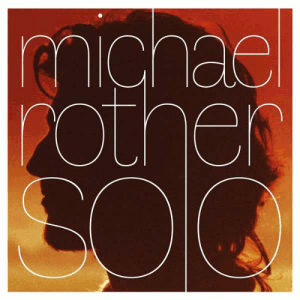 Well, this is a mammoth undertaking and no mistake. A mere three months after Herr Rother arrived once more in Londinium to rock the smooth, polished wooden bleechers of Hackney’s du jour gig venue EartH – a reviewing task I lazily palmed off onto my teenage soni – onto my digital doorstep lands the great man’s new Solo box set with an almighty whompfff. Comprising his first quartet of solo albums (Flammende Herzen, Sterntaler, Katzenmusik and Fernwärme), together with two soundtrack releases and four lengthy live and remixed pieces, this is truly a Biblical bounty of Rotherian goodness.
Well, this is a mammoth undertaking and no mistake. A mere three months after Herr Rother arrived once more in Londinium to rock the smooth, polished wooden bleechers of Hackney’s du jour gig venue EartH – a reviewing task I lazily palmed off onto my teenage soni – onto my digital doorstep lands the great man’s new Solo box set with an almighty whompfff. Comprising his first quartet of solo albums (Flammende Herzen, Sterntaler, Katzenmusik and Fernwärme), together with two soundtrack releases and four lengthy live and remixed pieces, this is truly a Biblical bounty of Rotherian goodness.
Over the course of the last half-decade, Rother’s place in the musical firmament has oscillated more wildly than an ocelot – from motorik visionary and innovator in the Seventies to wilderness wanderer in the lean years of the Eighties and early Ninetiesii – but with another turn of the wheel, his singular contribution to the guitar, and to dynamic, propulsive music, is nowadays embedded indelibly in the collective consciousness and recognised for its invention and ever lustrous sparkle.
Born in the mighty Hanseatic port city of Hamburg (and such entrepot cities by their very nature seem often to breed musicians of pioneering singularity), the young Rother spent packets of time in other parts of Germany, in Cheshire in England, and – importantly – in Pakistan. As well as being able to splash around in the surf considerably more than would have possible off the chilly coasts of northern Europe, the experience of so different a domicile taught the young Rother several indelible cultural lessons:I was exposed to music which was so different, and still is so different, from what young people experience when they grow up in Germany. It was fascinating for me to hear those rhythms and scales; everything was very mysterious. It’s not easy to explain what kind of effect that experience had. But it’s safe to say that it had a long-lasting impact on the way I see the world; being immersed in different cultures somehow struck a chord, I guess, because this idea of endlessness seems to have seeped into the way I think about music.
Straight from the horse’s mouth, as they say, and indeed it’s not hard to see how the languorous, looping inflections of Pakistani music permeated down into the Rother bedrock, later finding expression in his unique playing for collectives ranging from key German beat seed-bed Spirits of Sound, to the stomping proto-metal of, er, Kraftwerkiii to the often-imitated-never-bettered lange gerade of NEU!
After NEU! gradually disintegrated in the powerful solvent of the notoriously fractious relationship between Rother and Klaus Dinger (Rother’s other endeavours saw him recording in bursts alongside Hans-Joachim Roedelius, Dieter Moebius and Brian Eno), his first solo releases began appearing in a cluster (pun fully intended) from the late Seventies to the early Eighties.
And, as previously mentioned, four of those tasty morsels make up the very chewable spine of this box set release, and below, we’ll take a whistle-stop tour through each:
• Flammende Herzen (1977)
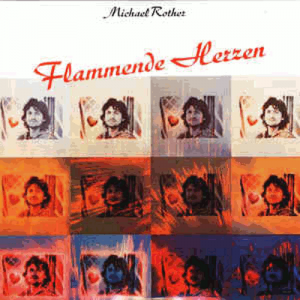 If you’re going to go solo, then you may as well go properly solo. Here, Rother goes hard, not home, by playing almost all the instruments himself: guitar, synth, bass, piano, organ and percussion. Only the drums remain in the hands of someone else, and when that someone else is Jaki Leibezeit, well, the quality controller can confidently book in a spot of fishing and take the day off really.
If you’re going to go solo, then you may as well go properly solo. Here, Rother goes hard, not home, by playing almost all the instruments himself: guitar, synth, bass, piano, organ and percussion. Only the drums remain in the hands of someone else, and when that someone else is Jaki Leibezeit, well, the quality controller can confidently book in a spot of fishing and take the day off really.
Stand Out Track – Rumbling low-key slide rocker “Feuerland”. If one strains one’s ears hard enough, one can just about make out the ghostly outline of what a Bowie-Rother collaboration (mooted at the time yet, seemingly, the victim of either interfering management, poor communication or both) might have sounded like. Jaki is on fine form, too, his playing very much atypically in the Apache Beat style, with only the tiniest of flourishes evident here and there (and all the more delightful because we know it’s him).
• Sterntaler (1978)
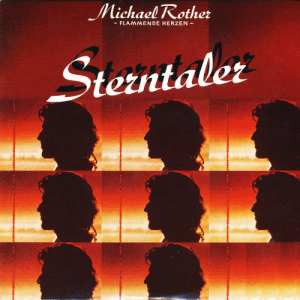 Rother’s second album, recorded and issued in 1978, follows on with perfect production continuity from his first.
Rother’s second album, recorded and issued in 1978, follows on with perfect production continuity from his first.
Stand Out Track – “Stromlinien”, with its almost Ennio Morricone guitar stylings, strong melodic structure and Rother’s rather lovely bass sitting unobtrusively in the background.
• Katzenmusik (1979)
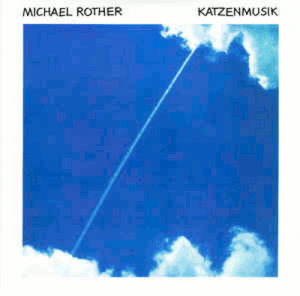 No prizes for guessing who was involved in this one. The mighty trio of Rother, Leibezeit and Plank are all once more in place for this third entry in the solo Rother canon. Here, though, Rother shifts the musical centre of gravity once again, perhaps bringing in a certain measure of Eno-ness (an Enogram?), and running fugue themes through twelve related pieces, which pick up, repeat and vary the motifs.
No prizes for guessing who was involved in this one. The mighty trio of Rother, Leibezeit and Plank are all once more in place for this third entry in the solo Rother canon. Here, though, Rother shifts the musical centre of gravity once again, perhaps bringing in a certain measure of Eno-ness (an Enogram?), and running fugue themes through twelve related pieces, which pick up, repeat and vary the motifs.
Stand Out Track – Not so easy to distinguish when the pieces are variations on themes, but “Katzenmusik 7” seems to really nail it, with beautiful guitar, some wonderful background synth and a classic Jaki drum pattern recalling perhaps a more restrained variation on Can‘s “Moonshake”. (“Katzenmusik 8” is hot on its heels though.)
• Fernwärme (1982)
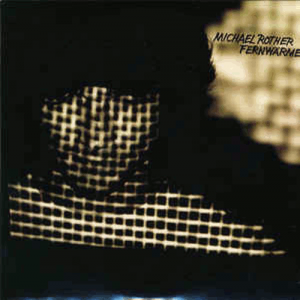 Into the brave new world of the 1980s, Rother’s solo career makes its first excursion. Back with Jaki, yet, notably without Conny. Unlike its predecessors, Fernwärme was recorded entirely in Rother’s own studio in Forst, with him at the controls. Considering that Plank had produced Rother’s entire catalogue up until this point, it was a brave decision, showing perhaps that Rother had gained in confidence to the point where he now found right to strike out on his own.iv As he would explain later:
Into the brave new world of the 1980s, Rother’s solo career makes its first excursion. Back with Jaki, yet, notably without Conny. Unlike its predecessors, Fernwärme was recorded entirely in Rother’s own studio in Forst, with him at the controls. Considering that Plank had produced Rother’s entire catalogue up until this point, it was a brave decision, showing perhaps that Rother had gained in confidence to the point where he now found right to strike out on his own.iv As he would explain later:
…when my solo albums became a success, starting in 1977, I felt the same confidence about that work as I did with Harmonia’s music. There was clearly no difference for me. I understood that I just had to rely on my own judgement and try not to be too affected by negative reactions while, on the other hand, not getting too excited and carried away by positive reactions. You just have to rely on your own feeling and hope that the audience catch up.
And one can hear Rother’s already accomplished touch at the controls, the sound of the album crisp and contemporary, updating his ever-masterful melodic sense for the changed sensibilities of the new decade. Synths, and the occasional drum machine, are very much in evidence, with the influence of his erstwhile bandmates Kraftwerk creeping in here and there, such on the ethereal landscape of “Elfenbein”. “Klangkörper” niftily shows the timelessness of Rother’s music, being obviously a clear genetic descendant of his previous work, yet also way ahead of the curve by at least fifteen years – indeed it could be released in 2019 and it would still sound as fresh as a spring meadow.Sound Out Track – The sprawling eight-minute Goethe rock of “Erlkönig”, with its sorrowful, almost flamenco, guitar motif and hi-hat masterclass from Jaki.
• Soundtracks (2013 and 2015)
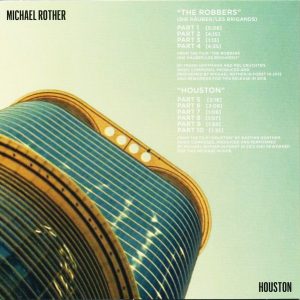 The fifth part of the epic Solo box comprises two film soundtracks composed on the bounce during the current decade for Pol Crutchen’s The Robbers (2015) and Bastian Günther’s Houston (2013). Of this unexpected – but actually entirely natural – digression, Rother explained:
The fifth part of the epic Solo box comprises two film soundtracks composed on the bounce during the current decade for Pol Crutchen’s The Robbers (2015) and Bastian Günther’s Houston (2013). Of this unexpected – but actually entirely natural – digression, Rother explained:
In 2013, I was approached by an agent working for the film company that produced The Robbers. They asked me whether I would be interested in contributing a score to the film. I don´t know why the company decided to reach out to me but I was definitely interested. Just a few months earlier I attended the Sundance Film Festival where the film Houston was premiered, for which I had created the score a year before. The world of film has always inspired me… I liked the drama and so I felt thrilled by the challenge of creating music for The Robbers.
And jolly glad we should all be too that Rother felt up to the challenge, for the music spread across these two sets shows a very different aspect of Rother’s compositional chops, realised too in a slightly different musical palate.
From the urgent stomp of “The Robbers (Part 2)” and the thunderhead drums of “The Robbers (Part 3)” to the shimmering atmospherics of the Houston variations, the imposition of some constraints on the music’s direction seem here to have freed Rother’s invention to takes some new directions. The humming synth underpinning the Houston tracks is often reminiscent of the hand-pumped harmonium drones that sit beneath Qawwali, and perhaps provides a nice example of Rother’s early influences still finding new expression in his music.
• Live & Remixes (Various)
Rounding things off is this grab-bag of assorted smithereens including the down-tempo heaviosity of “Drone Schlager” and the speedy lange gerade of “All Your Love is Gone”.
Stand Out Track – The fuzzy riffing of “Groove 139” is a thing of beauty. One to stick on in the car at maximum volume for that long haul down the M4.
~
So at last we reach the end of Solo, its haul of treasures now gleaming in the sunlight like a particularly abundant morning’s catch of herring. Being able to track a sizeable chunk of Rother’s solo work chronologically across the decades (and, to some extent, the genres) shines a powerful spotlight on both its similarities and discontinuities: it changes, yet it remains always distinctively Rother.And with the vagaries of “fashion” firmly in the rear-view mirror (particularly the often dehydrated mid-Eighties to late Nineties period), we can see clearly Michael Rother’s profound influence, both on his contemporaries exploring the terra incognita of the Seventies, and on those labouring to this day to carve out something new, something interesting at the frontiers of rock.
Rother, Jaki and Conny were truly a force to be reckoned with, and with two of that wonderful trinity now sadly departed, we need to ensure that last-man-standing Rother gets all the celebration that is his due. And there can surely be no finer way to do that than to wrap one’s ears around this glorious boxed set.
-David Solomons-
i Which he did a much better job of.
ii And boy, he wasn’t alone in that. The arid musical landscape of those times was chock-a-bloc with creative Titans forced to scratch a living in the musical dust. In 1991, you could hire a guitar colossus such as Bert Jansch for a train fare, £50 and pint or two of Fosters. I know because we did.
iii It’s true. Rother (together with sound of Heavenly choir Klaus Dinger) did a short stint in everyone’s favourite troupe of showroom dummies back when they were still non-robot and Ralf ‘the Doktor’ Hütter was temporarily out of the picture. The band’s June 1971 live set on Radio Bremen is an absolute rock monster (and available for inspection here ). It’s an interesting counter-factual to imagine just how different would have been the course of musical history if they’d stayed in this groove…
iv Not that Conny sat around on his backside watching the sky go by: his Eighties CV is replete with interesting and commercially-successful work including Devo, (The) Eurythmics, Killing Joke, DAF, Clannad and Echo And The Bunnymen. And, as if Conny couldn’t get any cooler, he turned down what would have undoubtedly been the most lucrative of the bunch, U2, saying “I cannot work with this singer.” Legend has it that Plank attended a U2 concert at Freilichtbühne Loreley, where Bono introduced him to the audience as their new producer, after which Plank is said to have left the concert and never communicated further with any member of the band.

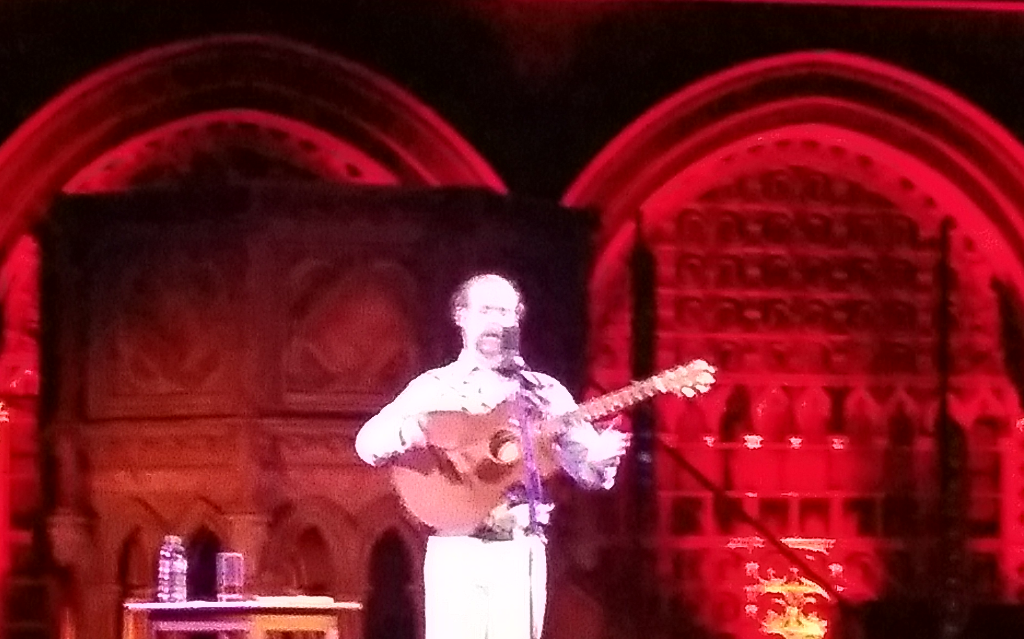
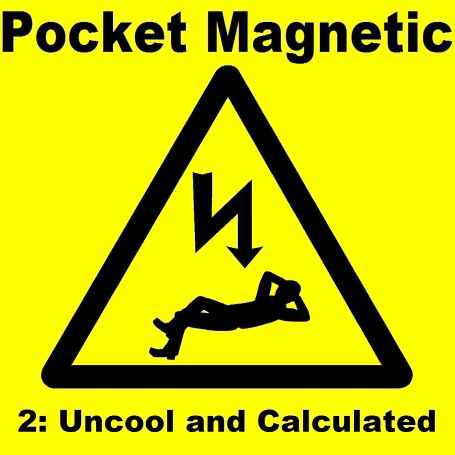
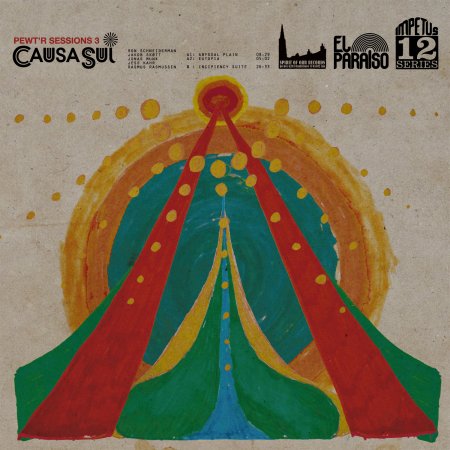
One thought on “Michael Rother – Solo”
fantastic review of what i call a masterpiece in a box my prize possession!